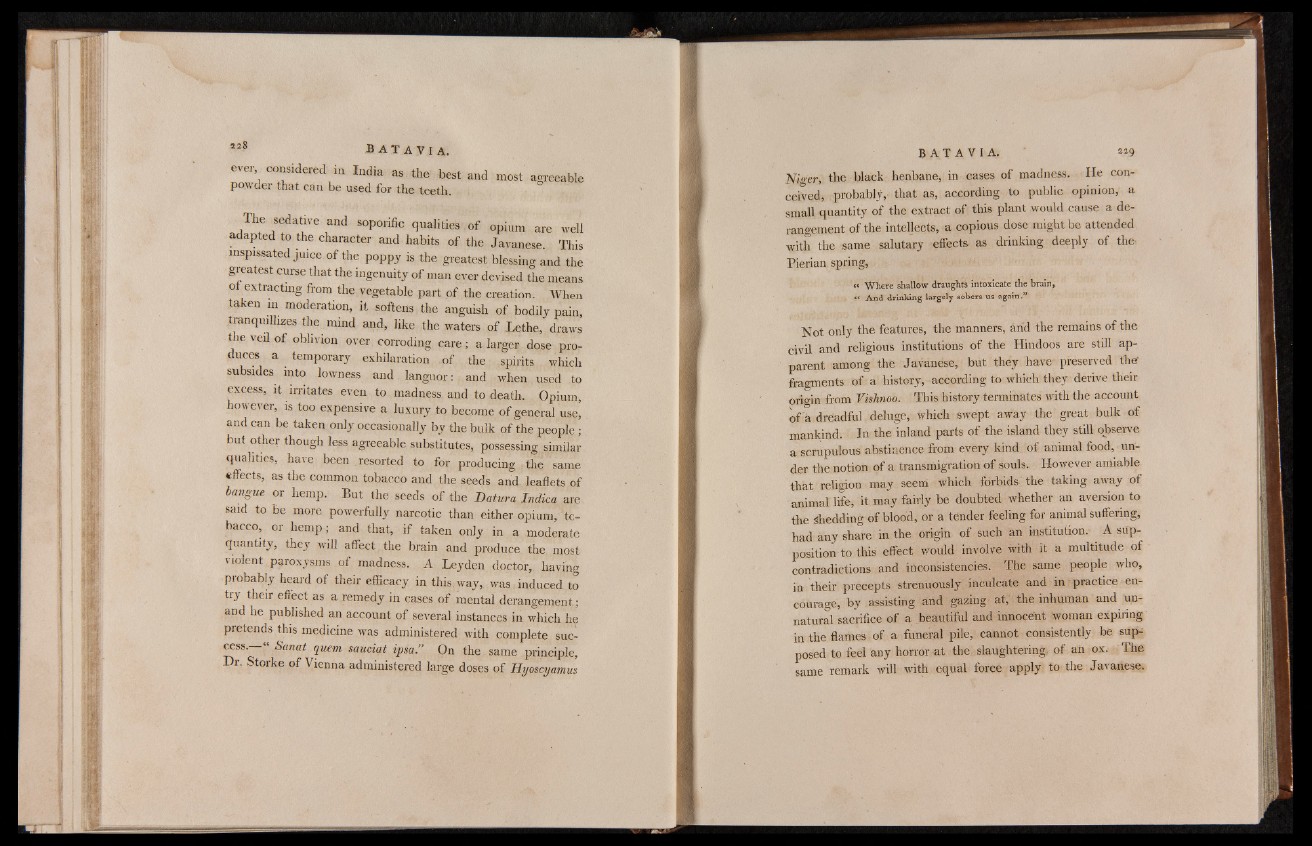
228 BATAVIA
ev'
er considered in India as the best and most agreeable
powder that can be used for the teeth.
The sedative and soporific qualities of opium are well
adapted to the character and habits of the Javanese. This
inspissated juice of the poppy is the greatest blessing and the
greatest curse that the ingenuity of man ever devised the means
ot extracting from the vegetable part of the creation. When
taken in. moderation, it softens the anguish of bodily pain,
tranquillizes the mind and, like the waters of Lethe, draws
the veil of oblivion over corroding care; a larger dose produces
a temporary exhilaration of the spirits which
subsides into lowness and languor: and when used to
excess, it irritates even to madness and to death. Opium,
however, is too expensive a luxury to become of general use’
and can be taken only occasionally by the bulk of the people;
but other though less agreeable substitutes, possessing similar
qualities, have been resorted to for producing the "same
effects, as the common tobacco and the seeds and leaflets of
bangue or hemp. But the seeds of the Datura Indica are
said to be more powerfully narcotic than either opium, ‘tobacco,
or hemp; and that, if taken only in a moderate
quantity, they will affect the brain and produce the most
violent paroxysms of madness. A Leyden doctor, having
probably heard of their efficacy in this, way, was induced to
try their effect as a remedy in cases of mental derangement;
and he published an account of several instances in which he
pretends this medicine was administered with complete success.—“
Sanat quern sauciat ipsa." On the same principle,
Dr, Storke of Vienna administered large doses of Hyoscyamus
Niger, the black henbane, in cases of madness. He conceived,
probably,' that as, according to public opinion, a
small quantity of the extract of this plant would cause a derangement
of the intellects, a copious dose might be attended
with the same salutary effects as drinking deeply of the
Pierian spring,
« Where shallow draughts intoxicate the brain,
. .« And drinking largely sobers us again.”
Not only the features, the manners, arid the remains of the
civil and religious institutions of the Hindoos are still apparent
among the Javanese, but they have preserved the1
fragments of a history, according to which they derive their
origin from Vishnoo. This history terminates with the account
of A dreadful deluge, which swept away the great bulk of
mankind. In the inland parts of the island they still observe
a scrupulous abstinence from every kind of animal food, under
the notion of a transmigration of souls.. However amiable
that religion may seem which forbids, the taking away of
animal life, it may fairly be doubted whether an aversion to
the Shedding of blood, or a tender feeling for animal suffering,
had any share in the origin of such an institution. A supposition
to this effect would involve with it a multitude of
contradictions and inconsistencies. The same people who,
in their precepts strenuously inculcate and in practice encourage,
by assisting and gazing at, the inhuman and unnatural
sacrifice of a beautiful and innocent woman expiring
in the flames -of a funeral pile, cannot consistently be supposed
to feel any honor at the slaughtering, of ail ox. The
same remark will with equal force apply to the Javanese.